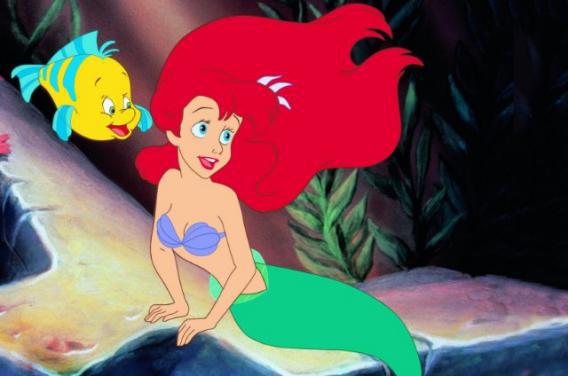It’s the hottest new thing: Not mermaids, exactly, but declaring that they’re the new vampires. Yesterday the Atlantic got in on the media feeding frenzy, declaring that it’s “official”: “dead, male, Edward Cullen-types are out, and vibrant, lively female sirens of the sea are in.” That article followed in the squishy finprints of articles at Vulture, the Huffington Post, the New Inquiry, ABC News, and a whole sea of others, all from the last few months.
But this supposed mermaid phenomenon has no legs. Journalists have been predicting that mermaids would overtake vampires since 2011, but that hasn’t happened. And it’s never going to happen.
In fact, these articles appear to be little more than a mer-Ponzi scheme. The Atlantic, for example, begins by citing as evidence the essay from the New Inquiry, which cites as evidence the articles from the Huffington Post and ABC News. It gets worse when you realize the scheme is corrupt: The New Inquiry article is written by the author of a YA novel about mermaids, and the article she cites at the Huffington Post is written by another author of novels about mermaids. Meanwhile, the Atlantic, the magazine of Ralph Waldo Emerson and Henry Wadsworth Longfellow, demonstrates no skepticism about any of this. It’s almost as if no one’s taking these mer-matters seriously.
What evidence do these compromised authors cite? Hardly any. From the ABC News article, for example, the Atlantic selects the factoid that “perhaps most impressively, there were over 18 mermaid books published last year.” More than 18! I don’t have the hours required to count how many vampire novels were written in 2012, but I can tell you that the answer is more than 700. I could go on: The Vulture article, for example, actually makes no claim that mermaids are the new vampires—instead it argues that maybe they should be—but that doesn’t stop other publications from citing it as evidence. Perhaps worst of all is Policy Mic’s “5 Reasons Mermaids Are the New Vampires,” which offers as its No. 1 reason “movies like Splash and Little Mermaid.” Of course, the box office smashes of 1984 and 1989.
Little of this matters, though, because I can give you one simple reason that mermaids aren’t the new vampires, and never will be: genitals. If you want people to fantasize about you, or about being you, genitals are pretty much a requirement.
Mer-partisans will try to counter this. They’ll claim that the lack of genitals just adds an alluring unattainability. Wasn’t that the point of Twilight, after all? This is factually wrong and woefully misguided. As anyone who knows anything about Stephenie Meyer’s saga will know, the whole driving force behind all the sexual tension in those books and movies is the fact that Bella and Edward are capable of having (spoiler alert) wild, headboard-tearing vampire sex. If there wasn’t that possibility of romance—and with mermaids, to make a long story short, there basically isn’t—there would be no sexual tension. Has there ever been a lasting vampire series that didn’t indulge in a little fang-banging? It’s the sole reason for True Blood’s existence.
To this, others will offer a cruder argument: Mermaids have boobs! There’s a simple response to this, too: Boobs are simply inferior to boobs plus the other bits. I will allow that there may be a sort of pubescent teen for whom this is initially appealing. Stephin Merritt has suggested that some men may “like the idea of women with all the knockers and none of the complicated parts,” and some women may have a similar feeling about men. But inevitably even these readers will quickly grow out of it, like Will Ferrell in the Saturday Night Live sketch or even Fry in Futurama. (“Why couldn’t she have been the other kind of mermaid, with the fish part on top, and the lady part on the bottom?”) What made vampires such a huge phenomenon is that they appealed beyond just the tween imagination.
(This goes for mermen as well, obviously, who are quite literally emasculated. Sorry, Derek Zoolander.)
This might be the saddest part of the whole pro-mermaid argument. A number of these articles argue that being a mermaid is empowering for women; the Atlantic article, in particular, focuses on celebrating this so-called “girl-power element.” But really it’s just infantilizing. If some women are so hungry to be desexualized that they’ll actually fantasize about being desexed, then that’s just depressing.
Before you label me sexist against mermaids—can you be sexist about something that has no sex?—here’s the biggest irony of all: Even mermaids agree with me. If you think it would be cool to be a mermaid, you probably haven’t paid attention to many mermaid stories. At heart, they tend to be about how it’s not cool to be a mermaid, about how the mermaids really just want to become women, perhaps to join with the prince, and to go “where the people are.” In the end, they just want to ditch the scales and walk around on our—what do you call ’em?—feet.
No, Mermaids Will Never Be the New Vampires

© 1989 Walt Disney Studios. All rights Reserved.
Advertisement